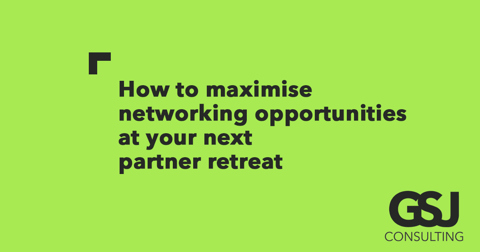15 tips to maximise your networking opportunities at a partner retreat

Partner retreat season generally happens a couple of months before the end of the financial year, and regardless of whether it’s your first partner retreat or your 20th, you need to make sure you follow a planned strategy to maximise your networking opportunities at the getaway.
Here are 15 tips to help you achieve this.
Before the retreat
-
Set down what your goals are. Don’t make too many. Do make them SMART (Specific, Measurable, Achievable, and Time-bound).
-
Be prepared. Know who the other partners attending are and what they do. Find out who their main clients are (ask your BD team for this information). You’d be surprised how often partners attend partner retreats and don’t have a clue who the partners outside of their immediate practice area are! To be fair, sometimes they don’t even know who the partners in their own group are!!
-
Take CVs (LinkedIn is a great source) of the top 5 or 10 partners you want to meet. This way you can review these in the hotel and stay familiar with who your targets are and what your talking points will be.
-
Get time in people’s calendars. Retreats are busy times. Lots of meetings and speeches to attend. More likely than not, a dinner will be included too. If you are a member of a management committee, you’ll probably need to go to one of these too. So, make sure to book some time in the diary with those 5 to 10 new partners you really want to meet and get to know.
-
Work on your elevator speech. Just like you may not know who all of your fellow partners are (see point 2), many of your fellow partners won’t know who you are. Unlike you though, they won’t have read this article, and they won’t be prepared for the retreat, so make sure to work on your elevator speech and fine-tune your story about who you are and what you do. Remember, you won’t have their attention for long, so make it count!
-
Email your clients and let them know you will be away for the next few days and won’t be checking emails or taking phone calls. Then put your out-of-office (OOO) on.
At the retreat
-
Listen actively to all the speeches and presentations. But also listen actively when your fellow partners are talking to you. Show genuine interest in what they do and who they do it for.
-
Listen twice as much as you talk. We have two ears and one mouth for a reason. Listen more than you talk. Don’t be that partner that talks the ear off every other partner about how wonderful they are and how massive their practice is, and boy, this firm would be on its last legs if it weren’t for them! Yes, there is always one at every retreat!!
-
Make sure to attend the social events. A lot of networking gets done at these events so don’t go back to your room to “catch-up on work” (see point 6).
-
Be approachable. Initiate conversations and make sure to include at least one person you don’t know or don’t know well in any of your conversations – particularly in social moments.
-
Be authentic. See point 8.
-
Share insight. By all means, have your small talk moments, but make sure to share insights that will make what you say stick in the minds of your fellow partners so that when they are next looking for a subject matter expert (SME) in your area, they know to call you!
-
Write notes. Take notes (on your phone/laptop/tablet or even handwritten) with a few bullet points of what was talked about and what actions need to be taken. For example, if you talked about a recent case that the other partners didn’t know about, send them a link to the case.
After the retreat
-
Connect on LinkedIn (if not already connected). You should really do this at the retreat, but you can make it a post-retreat action if you prefer to spend the time at the retreat doing the networking.
-
Follow-up. Offer to help or support a partner, or just send an email thanking the partner for their time. If the opportunity arises, refer them to a client you discussed.
Making the most out of your networking opportunities is about being proactive. Because networking is not all about having a beer and a chat with a bunch of like-minded people. Networking is about building meaningful relationships built on trust.
Contact GSJ Consulting
We can help you Aquire, Retain, Grow
The information contained in this article is of general nature and should not be construed as professional advice. If you require further information, advice or assistance for your specific circumstances, please contact us.
